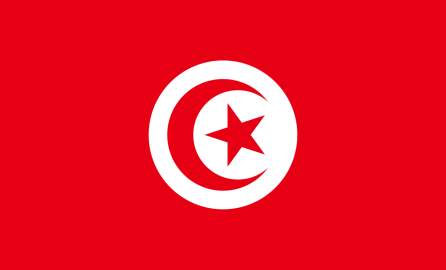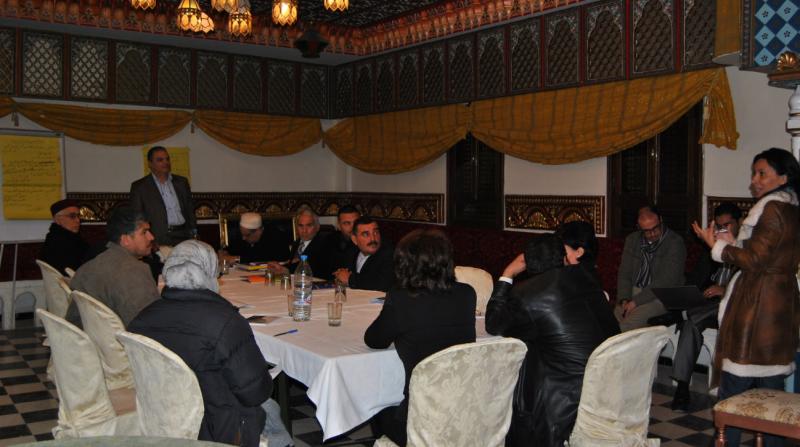With the fall of Ben Ali’s government at the beginning of 2011, space was suddenly created for the emergence of civil society in Tunisia. In the frenetic eleven months that followed, the European Commission (EC) was able to fund 24 new civil society initiatives across the country. Michel Mouchiroud of the EU Delegation in Tunisia shares personal insight and lessons learned from the process.
“The revolution took us by surprise,” said Michel Mouchiroud, who works with Civil Society and for Decentralisation at the EU Delegation in Tunisia. “Over the year and a half I had worked in Tunisia, prior to 14 January 2011, we could sense that inequalities were growing, as people individually commented on the systematic corruption that was taking place, but the awakening of the Tunisian people and their persistence to go to the streets and defy the power in place was a surprise, and it opened our ears to unexpected voices coming from the regions and from the youth movement.”
Mr Mouchiroud was recently in Brussels attending a seminar on Civil Society in the ENPI countries, where he presented a case study on the activities of 2011 for civil society in Tunisia. Following are excerpts from an interview with capacity4dev.eu, where he provided valuable insight to the process of assisting the development of fledgling civil society.
Main lessons learned
Michel Mouchiroud: “The main lesson learned was how time seems to speeds up when you enter a transition period, and the rapidity of reaction you must have when in the public eye to respond.
When initiating support to civil society in a transition context we had to keep in mind a number of important aspects:
- time frame and time periods of this transition from post-uprising to elections or political reform process;
- understanding of the abilities and capacities of the actors we want to engage with or draw information from;
- legitimacy of these actors;
- who were we not talking to? Where and what had not been covered?
In this sense, there was a need to quickly establish a plan of action, which enabled us to divide the political and financial support made available in three main phases: i) contribution to anchor the first gains of the revolution, i.e. freedom of expression/opinion and accountability of the government to its citizens for Tunisia, as well as to promote democratic principles and human rights; ii) support to the pre-transition phase leading up to democratic elections or political reform; iii) in parallel - or very quickly - answer to the more structural causes of the uprising: lack of economic and social opportunities and conditions.
A fourth aspect is linked to what, as donors, we can do to support the government's finances or actions that have a direct social and economic impact on the life of its poorest citizens, so that social services face no shortages and no void is open for other actors to substitute the state and proselytise.
Finally, an important lesson learned was the need to be extremely flexible in the approach and work with partners who had no or little experience in structuring an action and managing a project. This means that a lot of time the work plan had to be drafted and adjusted jointly along the way.
Tools used
“We used interviews, consultations with civil society organisations (CSOs) across the country, field visits, coordination meetings with technical and financial partners (TFP), and then responded to identified needs with thematic instruments of the EU.
At first, it was very important to just open the EU Delegation doors and listen. Listen to colleagues, to friends, to people in general as well as target our historical counterparts for information; the opponents to the regime who had never had a voice or were oppressed, as well as the provisional government that was put in place.
Documenting interviews and discussions was the best way to understand the first challenges and identify those players who were ready to mobilise quickly and start working on actions to support political reform and electoral technical assistance, guarantee the freedom of association and opinion, advocate for women's rights, and also foment the creation and emergence of new associations and leaders in the regions.
We were quickly granted financial allocations from the Instrument for Stability to fund these actions which, although it can be long and cumbersome in terms of administrative and financial procedures, was able to fund actions retroactively and provide direct grants so that our partners could start the work straight away.
This was completed by an extraordinary allocation under the Instrument for Democracy & Human Rights (EIDHR), with which we were able to target civil society initiatives through a call for proposals in support to democratic awareness and in preparation to the elections for a constitutional assembly focusing on citizen's education, improving quality and pluralism of media and access to information, engaging citizens in the electoral process through domestic observation of elections, and making sure that political parties were trained to represent people's interests and uphold human and universal values.
As we knew of the limited experience and capacity of newly formed associations to understand EU procedures and develop a proposal, we also used supporting measures under the EIDHR to train around 50 associations and opened the call to all Tunisian associations, regardless of their years of experience but not at the expense of quality. Our idea was really to make sure that citizens felt they could engage in the changes occurring in the country, with an idea of really establishing that matters are in the hands of the people and there is no going back to the old regime.
In order to address the more economic and social needs in the most deprived regions, we launched another call for proposals under the Non State Actors (NSA) budget line, with a top-up from the ENPI Civil Society Facility, which focused on helping Tunisian initiatives that have a local added value for community development.
In total in 2011, we were able to fund 24 new initiatives of civil society in Tunisia.
All in all, we were able to respond but we were very tested and, if it was not for the general motivation of some colleagues, we could have never managed to draft so many contracts in such a short timeframe, as our procedures are unfortunately not always adapted to respond quickly to urgent situations, or where the expectation to see things happening quickly is huge.
Main challenges
“The main challenge was to be able to respond quickly to the expectations of the Tunisian civil society to get involved whilst trying to make sure that we were addressing the political and social issues going on in 2011.
Another challenge was to manage the expectative as our political leaders announced the measures of support for the Tunisian transition, which obviously cannot be implemented straight away.
Finally, no one likes criticism, and the EU was an obvious target of criticisms in the aftermath of the revolution as it was criticised for its way of doing business with the former regime. This had its repercussions while engaging in forums with civil society, where time was spent explaining the ‘why’s and ‘what’s of the presence of an EU Delegation in Tunisia.
The one thing you would do differently, if given the chance
“I think I would get out to the regions that started the uprising quicker. With so much going on at the time, we focused on the work in Tunis and would have feedback through third parties on what was going on there. There was a need to probably talk directly to the people in their regions and start actions there faster.
A political transition is very much focused on the capital but it needs to be mirrored with more force at the local level.
The current situation
“In 2012, the challenge is stronger as the expectative has grown and the number of civil society initiatives with it. In this sense, it is an around the clock job to not only handle the more formal project formulation and management work but constantly monitor what's going on in terms of actors, themes and political or social issues, at national and regional levels. A lot of my time is spent setting up reliable networks of people or CSOs which can feed me with valuable and qualitative information.
Finally, for the future of Tunisia, despite the obstacles and the emergence of certain groups or the occurring of actions that undermine civil liberties, there is no doubt that they have a unique opportunity to develop a new type of democracy adapted to their national characteristics and history as an Arabic and Mediterranean country. I am very optimistic because there is a feeling of responsibility and they take pride that they are making history.”
Contributors to this collaborative piece: Michel Mouchiroud, Rene Madrid and Paul Riembault. The views, opinions and the content herein do not represent the official view of the European Commission. Multimedia and collaboration facilitated by EuropeAid's capacity4dev.eu team.




Log in with your EU Login account to post or comment on the platform.